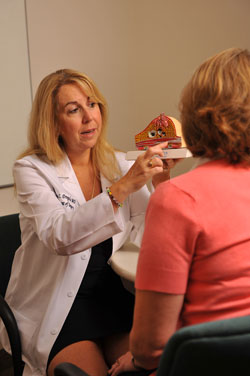Preventive Breast Health and High Risk Program

The Aiello Breast Center offers a comprehensive breast preventive health and high risk program. Our mission is to be your resource for breast problems or imaging concerns, providing appropriate evaluation and strategies to lower your risk of breast disease and cancer.
If you answer yes to one or more of the following questions, you may benefit from a cancer assessment and risk evaluation.
- Are you at increased risk for breast cancer with an interest in preventive strategies?
- Do you have family members with breast or ovarian cancer or a BRCA gene mutation? (We see both men and women in these families.)
- Have you ever had ovarian cancer or received chest wall radiation treatment?
- Have you been told that your breasts very dense or your exams are difficult and lumpy?
- Do you often need extra mammogram views or have a concern about your breast imaging?
- Have you had prior breast biopsies — especially with abnormal cells (such as “radial scars,” “Atypical Hyperplasia: ADH or ALH,” or “LCIS”)?
- Have you used hormonal therapy especially more than two to five years after menopause?
- Do you have concerns like unexplained breast pain, breast skin changes or nipple problems?
- Do you have other risk factors like Ashkenazi Jewish ancestry, smoking weight gain or lack of exercise?
Personalized consultation and follow-up visits in the preventive health and high risk program at the Aiello Breast Center may include the following services:
- Personalized review of your current breast problems or concerns
- Individualized risk assessment using software for computer-generated risk analysis that is based on your personal factors and family history
- Clinical breast exam and instruction to improve your breast awareness
- Review and explanation of your mammography or breast images to correlate to physical exam, and when necessary, bedside breast ultrasound
- A personalized breast surveillance plan: Recommendations for timing of mammograms, and possibly sonograms, 3D mammograms and MRI technology appropriate for age or concerns, to reduce unnecessary imaging and limit radiographic exposure
- Preventive strategies and specific lifestyle improvements to reduce the risk of breast cancer
- In some women, consideration of approved medications understood to reduce the risk of breast cancer
- Local referrals for genetic counseling and testing at the nearby Tate Center; nutrition, primary care or gynecology, and/or plastic surgery
- Consult for surgical options here (or your surgeon of choice) for biopsy or in some high-risk women for “risk-reducing” mastectomies
- Option to be followed here for your exams, risk-reducing plan, imaging updates and also discuss ongoing scientific advances in breast health
